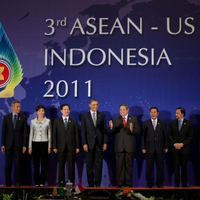It is usually difficult to judge with certainty the outcome of international summits in their immediate aftermath. But last weekend’s East Asia Summit in Bali, Indonesia, made at least one thing clear: The Obama administration has managed to mend the rift with the member countries of the Association of South East Asian Nations that emerged under President George W. Bush. At Bali, President Barack Obama received strong and positive feedback from ASEAN countries. And in advance of the summit, he strengthened the United States’ historic alliance with Australia, a country that seems to be emerging with a new role in the region.
In this context, the People's Republic of China appears to have been left politically diminished. But it is worth noting that both economic and trade relations in the region reflect an opposite trend.
Obama began his Asian diplomatic offensive in Honolulu, where leaders of the 21 countries that make up the Asia-Pacific Economic Cooperation forum met in order to discuss trade and economic relations. From there, he headed to Canberra, where he and Australian Prime Minister Julia Gillard announced details of a new military arrangement between the two countries. According to the agreement, Australia will host a full U.S. Marine task force in the coming years at its base in Darwin. About 250 U.S. Marines are scheduled to arrive next year, with the contingent eventually ramping up to 2,500 personnel.

